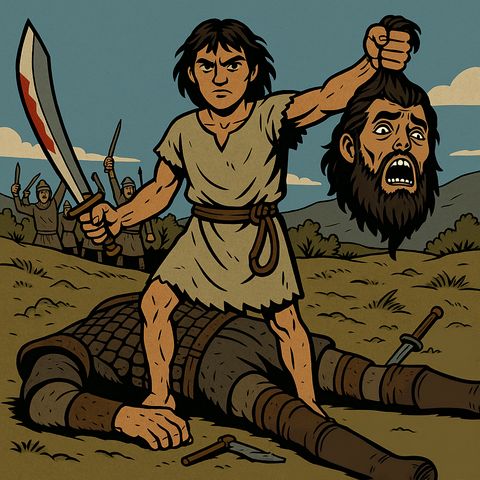
Psalm 151
From the Greek Septuagint
About
A short, memorable Psalm not found in the traditional Hebrew text. It appears to be a much later addition to Psalms that may have been made by combining parts from two other (non-Biblical) Hebrew songs together. The Psalm’s introduction claims that it was written by David. If that’s true, then we have nothing to corroborate that claim.
The contents itself contains no new or unique information; it only repeats what’s said elsewhere in the Bible.
It is not considered inspired by Catholics, Protestants, or Jews. In contrast, Eastern, Coptic, Armenian, and Syrian churches consider it canonical.
There were, of course, many Psalms that people wrote over the centuries. Only those that were considered inspired were included in the Bible book of Psalms, but many others can be found in ancient manuscripts. This one was probably just added to the Greek version of Psalms because people liked it and believed it was really written by King David.
Source
We’ve translated it from Greek Septuagint manuscripts dating from the 300s AD; that makes our sources about 600 years older than the traditional Hebrew text used by other Bibles. Learn why.
Translation
- Known and suspected fake words and phrases commonly included in popular translations are
[greyed-out], followed by a link to our spurious texts article. - Alternative translations and editor notes appear [like this].
- Text that’s missing from our source manuscript, but filled in from another source, is marked with [[double brackets]].
- All circumlocutions for God’s Name appear as '[Jehovah][Yahweh]“Lord”'. You can change this to '[Yahweh]' or “Lord” in your settings.
- Many names use CamelCase to show where they contain references to different Gods, e.g. IsaiAh, JeruSalem, etc. Learn why. You can toggle these on or off in your settings.
- The original texts had no chapter or verse numbers, paragraph breaks, line breaks, margins, punctuation, or capital letters. These are all added for clarity, but be aware that they can sometimes subtly alter the meaning. Learn more.
- Words [inserted] by the translator for clarity are always in [brackets]. These are not part of the original source text. Learn more.
Approval
This translated text has been proofread against our original Greek source manuscript. It was approved by the editor on November 28, 2024.
151
1This psalm is David’s own composition, outside the numbered collection—written after his duel with GoliAth.
I was youngest of my brothers,
Smallest in my father’s house…
So I tended my father’s sheep.
2My hands crafted [a] lyre,
My fingers shaped [a] harp.
3But who could tell [Jehovah][Yahweh]“Lord”?
He himself was listening.
4He sent his messenger
And from the sheep, took me…
Then with his oil,
He anointed me.
5My brothers? Tall and strong.
But [Jehovah][Yahweh]“Lord” didn’t choose them.
6I marched out to face the foreigner—
With his idols, he cursed me.
7So I grabbed his own sword—
Cut off his head!
And lifted Israel’s shame.
Creative Commons License
This translated text and any accompanying artwork and audio is freely available to everyone under the Creative Commons BY-NC-ND 4.0 license.
You're welcome to copy, share, print, and quote it as long as you give attribution to the 2001 Translation, it's not used for commercial purposes, and that no derivative works are created from it. Learn more.